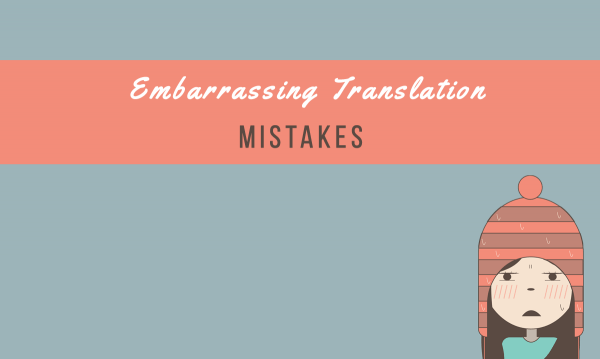Have you ever had an embarrassing translation faux pas that is so cringe-worthy it made you want to duck to the nearest restroom and hide there forever?

Or probably pronounced a French word so inappropriately that it made everybody snicker?
French words, with its subtle nuances and undertones, is quite easy to bungle.
You might be saying something that you think is totally innocent, but the word you choose or a slight error in your pronunciation could all too easily make you sound like a horndog pervert...or even highly rude and offensive.
“Did I just say THAT?!”
Don’t worry, you’re definitely not alone. Stuff like this happens to the best of us. Pronunciation mistakes are common in the French language especially if it is not your native language. But to avoid awkwardness from happening ever again, you should take a look at this list of words and phrases we compiled.
So without much ado, let’s get on with the list of common pronunciation mistakes in French.
1.“Je suis chaud(e)” or” Il/elle est trop chaud(e) “ does not mean what you think it means.
You probably mean you’re not feeling well and your temperature is hot. After all, Je suis chaud = I am hot. Right???
Nope. “Je suis chaud” has a sexual connotation that tells everyone you’re feeling horny (what?!). So say “J'ai chaud" instead. Similarly, when you say “il est trop chaud” to say someone is too hot in temperature, it could be taken to mean that you have the hots for that particular person. Which is weird especially if you’re related.
2. Preservative is not preservatif in French
Imagine you’re sitting in a table with your French-speaking friends, and you’re giving a completely impassioned speech about organic food and the use of too much preservatives in food nowadays. You use the French word preservatif because of course, what else could the word be?
Sorry to rain on your parade, but while preservative and preservatif may sound alike, it’s one of those back-stabbing “false friends” or cognates. Preservatif actually means condom in French. When you need to talk about food preservatives, use the French word “conservateur” instead. Otherwise, you’d ruin your perfectly sensible tirade by suddenly including condoms in your conversation.
3. Don’t say “Il/elle est bon(ne)” or “Tu es bon(ne)”...unless you know exactly what you’re doing (*wink*wink*)
English speakers usually say “she’s good” or “you’re good” in a general, offhand way, without having to specify what the person is good at. Like when someone shows off his/her talent and you just blurt out, “wow, you’re good!” This does not translate well to French however.
When speaking French, you have to be specific about what the person is good at or else it could be misinterpreted as you saying how he/ she is good in bed.
4. “Introduire” does not really mean “introduce”
This is another one of those two-faced false friends. Though introduire looks the same as introduce, they don’t mean the same thing. Introduire means “to insert/ to enter”.
Let that sink in for a while.
Now can you imagine how awkward it would be if you ask a group of French people to introduce themselves to each other when you’re using the French verb “introduire”? (clue: it would sound like you want them to have an orgy! Yikes!)
When you need to introduce someone or ask people to introduce each other, use the verb présenter.
5. “Je suis excité(e) !”
You’re excited. We get it. When you’re speaking in English, it’s perfectly fine to just squeal, “I’m so excited!” Don’t do this when you’re speaking French. Saying “Je suis excité(e)” could be wrongly interpreted as you squealing and jumping up and down about how sexually aroused you are.
Instead, you need to include in the sentence what you are excited about to avoid any raised eyebrows and incredulous looks around you.
6. “C’est excitant! “
In relation to #5, it’s easy to think that “c’est excitant! “ means “it’s exciting!” But the French could take it to mean you’re feeling sexually aroused.
7. “Je veux jouir “
Let’s say you’re out with friends for a night around town. During dinner you declare that tonight, you would like to enjoy yourself. You say, “je veux jouir !” thinking it means, “I want to enjoy!” Everyone smother their laughter and think how brazen you are.
Well, it seems like just another harmless sentence, right? Though jouir is the more formal verb that translates to “to enjoy”, you’ll have to be careful and make sure to use it in the proper context. Otherwise, you’d be saying that you want to have an orgasm.
*awkward*
8. Prendre son pied
This is an idiomatic expression that literally means “to take one’s foot”. And though its meaning is rather innocent, which is “to take pleasure at something” be careful when using this term because it has underlying sexual connotations. It has an innuendo that means “to have an orgasm”.
9. Envie is not always the same as envy
When you say “J’ai envie de toi”, you’re not really saying that you envy someone. Instead, you mean you desire or you want him/her. So you should just say you are envious (envieuse/ envieux) or say instead “je t’envie”.
10. Un baiser the noun isn’t the same as baiser the verb
Since the word kiss in English can work both as a noun (a kiss) and as a verb (to kiss), it’s easy to think the same thing with its French counterpart. After all, the word baiser can both be a noun and a verb too, right?
Oh, you sweet summer child. It isn’t the same. While un baiser does mean “a kiss”, baiser used as a verb means to shag or to f*ck. Totally not the same at all.
If you need to say “to kiss”, as in the verb, use the verb embrasser instead. You can also use its reflexive form s’embrasser which means to kiss each other.
Other words related to “kiss” are: un bisou (a slang term for kiss), une bise (the kiss on the cheek the French use for greeting people), and un patin (kiss that uses tongue, or what English speakers refer to as French kiss).
11. Chatte means two different things
Chatte is just a harmless female cat, right? Well, yes, but it’s more than that, too. Same as its English counterpart, the feminine version of the word cat in French could also mean the female private part.
12. Cochonne has another meaning, too
Cochonne means a female pig in French. In other languages, pig could be a term used to say how someone eats too much or acts like a slob. But in French, the term cochonne is a rather vulgar term used to refer to a woman who loves sex in a dirty way.
13. ça/il suce !
It’s quite easy to mistakenly translate the English expression “it sucks” or “he sucks” to its literal translation in French. But doing so would be very weird and vulgar. In French “sucer” (to suck) mainly has a sexual meaning and isn’t used in the same manner as its English counterpart.
To say something is lame, you can say “c’est nul !” To tell someone he is lame, say “t'es nul/chiant”. To point out that something sucks, say “ça craint !”
14. Je suis tellement pleine !
Let’s say you had a huge lunch with your French friends. You want to tell them you’re so full, so you say it in French as “Je suis tellement pleine !” They all stare.
Why? What’s wrong with what you just said?
Well, my dear, you have just informed them that you are pregnant. If you’re not pregnant at all and it’s just the two servings of dessert in your stomach and not a baby, you can perhaps just say “j’ai trop mangé” (I ate too much) instead.
15. Queue could mean something else entirely
Queue in French has different meanings: 1) a waiting line; similar to how the word is used in English, 2) an animal’s tail… or 3) the more vulgar slang term for the male private part.
So be very, very careful when using this term.
Let’s check out a rather awkward scenario between two girls, as an example.
Non-French girl: I went to see the concert.
French girl: How was it?
Non-French girl: Il a une grosse queue.
French girl: “eyes widen, jaw drops*
The non-french girl wanted to say that the line was very long, but missed out y between il and a. As a result, she instead announced that the guy in the concert was well-endowed.
We have just listed 14 different translation mistakes. But what about those wrong pronunciation that could land you in hot water? Here let’s take a look at those as well.
16. Baisser vs. Baiser
They both look and sound almost the same but baisser means to reduce or to lower, and baiser means… you already know what it means.
To distinguish between the two and to make sure you use the right one, remember the following rules:
Baisser (double S): pronounced with an S as in beh-Say
Baiser (single s): pronounced with a Z as in beh-Zay
There. That should keep you from hair-raising embarrassment.
17. Quand vs Con
Be careful in pronouncing these two as you don’t want to mix up a simple “when” (quand) and “idiot” (con). Can you imagine how awful it would be if you thought you’re only saying quand but the person you’re talking to thinks you just called him con?
To avoid any misinterpretations, take note of these pronunciation differences:
Quand: pronounced as kon[d]; note that the letter d is very subtle.
Con: pronounced as ko[ng]; note that the ng is almost silent.
18. Cou vs. Cul
This one is another common facepalm-inducing mistake. They sound somewhat similar but are two very different body parts. Cou is neck and pronounced as koo; while cul is ass and pronounced kew.
19. Beaucoup vs. Beau cul
Another pair of terms that could land you in trouble when you pronounce it wrong, so once again, be very careful. The first one---beaucoup---is a harmless word that means “very”. The other one means “nice butt” or “nice ass”. To avoid saying “thanks! nice ass!” when you say merci beaucoup, remember that beaucoup is pronounced as bo-koo while beau cul is bo-kew.
20. Branly vs. Branler
It’s easy to slip up and erroneously pronounce the famous museum Musée du Quai Branly. But make sure to say it as bran-lee and not bran-lay. Branler (pronounced as bran-lay) is a slang term for touching yourself.
So, can you see? A small mistake in pronunciation would give an altogether different meaning when you ask for directions to Branly.
21. Canard vs. Connard
Canard means duck and connard is a vulgar term that means asshole, jerk or schmuck. Be very careful not to confuse the two. Otherwise, you’d think you’re simply discussing what to order while the people around you would think you’re muttering invectives.
To avoid this error, try to remember the following pronunciation differences:
Canard is pronounced as kah-nar.
Connard is pronounced as ko-nar.
22. En couleur vs Enculer
This one was submitted to the Talk in French Facebook page by a lady named Paulette. One of her fears is when the printers in her office would break down and she would have to explain to technicians that there is a problem with colored printing.
It’s a legitimate fear, and we’d have to agree! While en couleur is a rather innocuous term that means “in colour”, enculer is anything but. It means something offensive like “motherf*cker” or the sexual act that involves the behind. Avoid this with the following pronunciation tip.
En couleur: en koo-LEURR (try to accentuate the “leur” part at the end of the word to avoid any confusion)
Enculer is pronounced as en-kew-lay
Please note that this phonetic pronunciation for this last one is not very spot on. But you can listen to the pronunciation in audio in the article 30 Difficult French Words to Pronounce: Part 2.
Do you have additional embarrassing words to add? How about some toe-curling, blush-worthy anecdotes that you could share? Feel free to let us know in the comments!
Get updates to the weekly articles + lots of freebies when you subscribe to the Talk in French newsletter.
SIGN UP BELOW...
AND GET INSTANT ACCESS TO THE FREEBIES


Speak, Listen, and Write French like a Native with Talk in French Complete Courses

I hope you had as much fun writing these as I had reading them, cher Frederic! I laughed the entire time. Merci beau cul! MDR
Thanks for the Article, you made my day.
Haha, trop drôle! Le français est ma langue maternelle, mais je vis en milieu majoritairement anglophone et il y a plusieurs faux amis que nous utilisons sans nous en aperçevoir. Numéro 4 par exemple… oh et 14 aussi! Haha! Noté pour ma prochaine balade outremer en sol français! 😛
While in Lyon, studying with my voice teacher, he had a baritone student who was singing the Count’s aria very well. Afterwards, I said to him, “Vous avez bien chanté le Com(te).” There was shocked silence and then my teacher said, “t.” They were laughing so hard that they could not explain my error at that time. Needless to say, I was very embarrassed!
Ahah excellent story. Thx for sharing
I did have a friend who kept trying to “correct” my pronunciation by telling me I was saying “merci beaucoup” wrong and giving me the close pronunciation of “merci beau queue” and then “merci beau cul.”
I also was amused to discover that manifestation is not the same.
In French, it is a gathering / group of people, usually before protest/demonstration.
In English, it usually refers to something incorporeal that is hidden that visually appears/becomes evident (a ghost, someone’s emotions, symptoms of illness, etc.)
I was to read “mon histoire”, to my French Club so I was using google to learn how to pronounce “improvement”, in French. Instead of ‘Amélioration”, google interpreted my pronunciation firstly as, “Une mer érection”, then as “Une meilleure érection.” After a few attempts I nailed the pronunciation, but it was so funny that I had to tell them of my initial attempts.